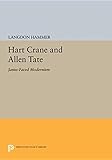Hart Crane and Allen Tate : Janus-Faced Modernism / Langdon Hammer.
Material type: TextSeries: Princeton Legacy Library ; 5176Publisher: Princeton, NJ : Princeton University Press, [2017]Copyright date: ©1993Description: 1 online resource (296 p.)Content type:
TextSeries: Princeton Legacy Library ; 5176Publisher: Princeton, NJ : Princeton University Press, [2017]Copyright date: ©1993Description: 1 online resource (296 p.)Content type: - 9781400887194
- 811.5209
- PS3505.R272
- online - DeGruyter
| Item type | Current library | Call number | URL | Status | Notes | Barcode | |
|---|---|---|---|---|---|---|---|
 eBook
eBook
|
Biblioteca "Angelicum" Pont. Univ. S.Tommaso d'Aquino Nuvola online | online - DeGruyter (Browse shelf(Opens below)) | Online access | Not for loan (Accesso limitato) | Accesso per gli utenti autorizzati / Access for authorized users | (dgr)9781400887194 |
Frontmatter -- Contents -- Preface -- Acknowledgments -- I. Janus-Faced Modernism -- One. Toward the Institute of Literary Autonomy and Tradition -- II. Tate: The Right Kind of Modernism -- Two. The Realism of The Waste Land -- Three. Genius and the Rational Order of Criticism -- Four. The Burial of the Confederate Dead -- Coda. "Mrs. Tate's" Tombstone -- III. Crane: Modernism in Reverse -- Five. A Resurrection of Some Kind -- Six. Dice of Drowned Men's Bones -- Seven. The Floating Singer of The Bridge -- Coda. Unanswered Questions -- IV. Beyond Modernism -- Eight. Robert Lowell's Breakdown -- Notes -- Works Cited -- Index
restricted access online access with authorization star
http://purl.org/coar/access_right/c_16ec
Focusing on the vexed friendship between Hart Crane and Allen Tate, this book examines twentieth-century American poetry's progress toward institutional sanction and professional organization, a process in which sexual identities, poetic traditions, and literary occupations were in question and at stake. Langdon Hammer combines biography and formalist analysis to argue that American modernism was a Janus-faced phenomenon, at once emancipatory and elitist, which simultaneously attacked traditional cultural authority and reconstructed it in new forms. Hammer shows how Crane and Tate, working in relation to each other and to T. S. Eliot, created for themselves the competing roles of "genius" and "poet-critic." Crane embraced the self-authorizing powers of the individual talent at the cost of standing outside the emerging consensus of high modernist literary culture, an aesthetic isolation which converged with his social isolation as a gay man. Tate, turning against Crane, linked the modernist defense of tradition to an embattled heterosexual masculinity, while he adapted Eliot's stance to a career sustained by criticism and teaching. Ending his book with a discussion of Robert Lowell's career, Hammer maintains that Lowell's "confessional" poetry recapitulates the conflict enacted by Crane and Tate.Originally published in 1993.The Princeton Legacy Library uses the latest print-on-demand technology to again make available previously out-of-print books from the distinguished backlist of Princeton University Press. These editions preserve the original texts of these important books while presenting them in durable paperback and hardcover editions. The goal of the Princeton Legacy Library is to vastly increase access to the rich scholarly heritage found in the thousands of books published by Princeton University Press since its founding in 1905.
Mode of access: Internet via World Wide Web.
In English.
Description based on online resource; title from PDF title page (publisher's Web site, viewed 24. Aug 2021)


